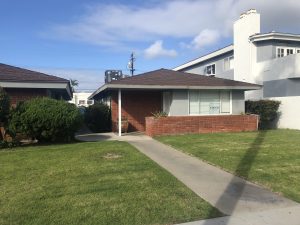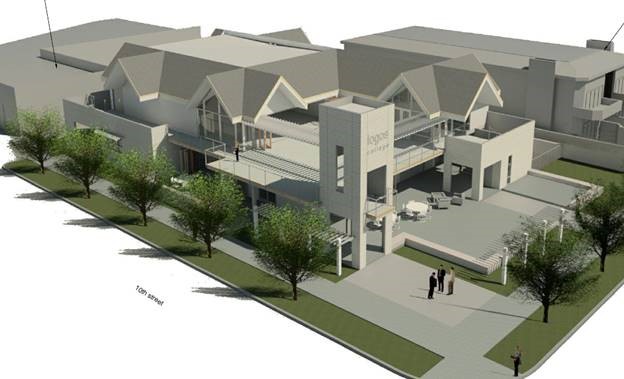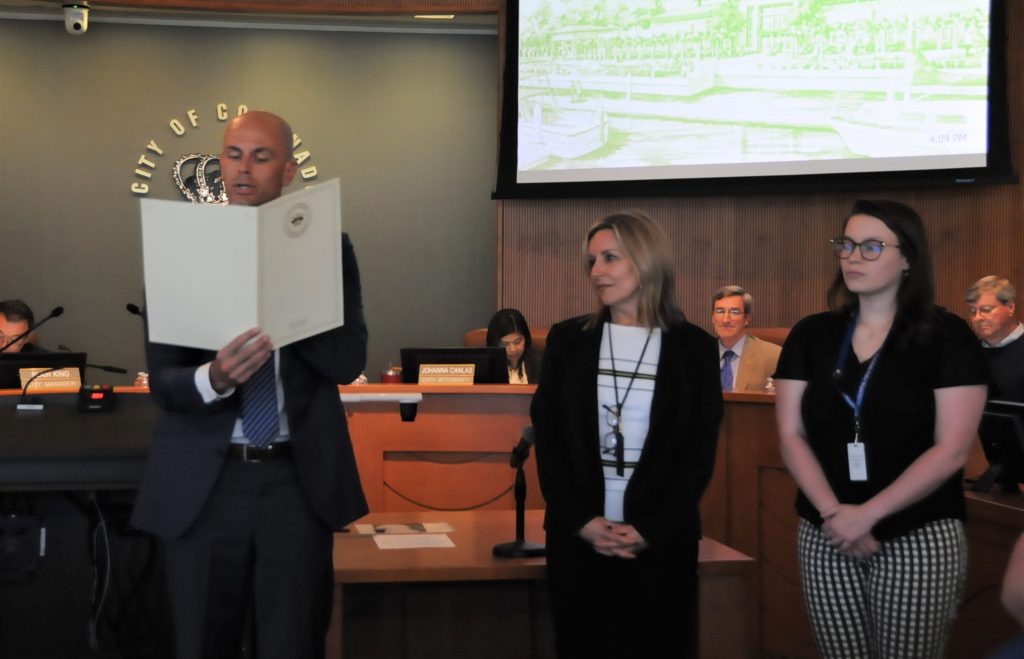The City Council meeting began with Mayor Bailey giving a presentation to Dispatcher Supervisor Jill Branch and Dispatcher Rachel Billeter proclaiming April 14 – 20, 2019, as National Public Safety Telecommunicators Week. The Dispatch Center personnel are vital to the city’s public safety and answered 7,315 9-1-1 calls and handled 34,444 incidents in the past year.
Community Grants
The most lengthy discussion of the evening focused on the Community Grants Process. With hours of discussion, the highlights are outlined below, and full details can be found by watching the video of the meeting on the city’s website. Final decisions were not reached, and the council voted to make recommended changes to this 2.0 version and create a 3.0 version to bring back to the next council meeting for approval. The council expressed gratitude for all the work the community organizations do for our town and want to find the best solution to help them.
The Council appointed a subcommittee of Mayor Bailey and Councilmember Donovan to evaluate the grant process incorporating lessons learned from past years and making recommendations for a balanced and fair system. They also looked at how other organizations administered this process. The suggested policy changes include:
- Update the mission statement to state, “The purpose of the City’s Grant Program is to strengthen our sense of community by enhancing Economic Development, Social Services, Arts, Community Pride and Sense of Place through partnerships with local nonprofits to administer events, services, activities, and purchases more efficiently and economically than possible through the municipal corporation.”
- Require the Council adopt a budget for each “Core” item during the budget workshop.
- Require each grant request to be discrete from all others.
- Require all “Non-Core” grant requests to apply for a grant under a specific “grant type” (special event, service, seed money, or one-time purchase).
- Require all “Non-Core” grant requests contribute to one of the four community elements (Economic Development, Social Services, Arts, Community Pride and Sense of Place) as detailed in the grant policy.
- Establish objectives for each community element.
- Create a rubric for evaluating the strength of organizations and applications. Suggested Application Changes:
- Applications are specific to the event, service, activity or purchase that funds are being requested. *Note, this may result in one organization submitting multiple applications for different items.
- Applicants are required to estimate the cost of event, service, activity, or purchase being requested.
- The application allows groups to easily identify if they are requesting a multi-year agreement.
- The new rubric is included in the application and applicants are encouraged to submit a detailed application which answers/addresses the rubric criteria.
- Organizations also requested a meeting where one representative from each group would be present to present their case as the grants were awarded.
Discussion highlights included the question, from both councilmembers and community members, of why the cap is $1 million if the city is flush with cash. The mayor said, “Not having a policy in place is a disservice to the taxpayers.” He went on to explain that the amount could flex if needed as it did last year.
Councilmember Sandke pointed out that within economic development, one of the city’s priorities, the organizations weren’t categorized correctly. Councilmembers Heinze and Benzian and several organization representatives agreed. Councilmember Heinze said, “We agree with the goals, but we need structure, goals, and limits with better defined categories.”
The four community values are: community pride, arts, social services, economic development, and sense of place. Part of the problem came down to a matter of semantics with the category’s “core” vs “non-core” in prioritization. There was also a discussion of one application vs multiple applications for organizations that fell in more than one category. Everyone agreed that the timeline for granting monies needs to be done so that the organizations have the certainty of monies to plan their yearly budgets. Councilmember Benzian suggested that they seek an outside opinion, like a university capstone thesis, to find the best solution to administer this vitally important program.
Logos Youth Center

The most heated topic of the meeting was the Major Special Use Permit (MSUP) to allow construction for the Logos Youth Center at 970 C Avenue. Councilmember Sandke had to recuse himself from this vote due to close property conflict. The Logos Youth Center was a proposed multi-purpose, private youth center designed to serve middle school and high school-aged kids of the community and their families.

Senior Planner Jesse Brown shared the highlights of the process from when the first permit applications were submitted in September 2018 to approvals by both the Design Review Commission and the Planning Commission. A proposed operational and parking schedule were shown. The project description includes a two-story, nearly 10,000 square foot youth center with 29 underground parking spaces. The first floor would have an interior square footage of 4,400 square feet with a middle school room, ancillary kitchen, storage and restroom areas, indoor basketball court, and outdoor patios. The second floor had a 4,504 square foot interior space with a high school room, outdoor deck and restrooms. The total proposed Floor Area Ratio (FAR) was .71.
Community concerns were increased vehicular traffic, pedestrian and bicycle safety, building occupancy, overnight accommodations, event/banquet use, outside Coronado use, noise/amplified sound issues, commercial use of property, smoking and alcohol use, and expansion and intensification. Several residents spoke during the public hearing portion including Francette Roeder, who wanted to ensure that the facility was only for school age children, not adults, and voiced her desire for a scaled-down version of the project. This sentiment was echoed by Councilmembers Donovan and Benzian. Councilmember Donovan said, “The size, bulk and mass seem out of proportion for the neighborhood. It would exacerbate traffic density.” Councilmember Benzian said, “The intentions were probably good, but this is a congested area. It seems too big for 50 kids.”
The Mayor said, “The FAR is less than the required number and it was passed by the Design Review and Planning Commissions. If they weren’t on board, I’d have greater concerns.” There was much discussion and consultation with City Attorney Johanna Canlas regarding the enforcement of stipulations that were placed on the project. In the end, Councilmember Donovan made the motion to deny the project and Councilmember Benzian voted with him. Mayor Bailey and Councilmember Heinze voted for the project. The project will not move forward, because Councilmember Sandke was recused, a 3-1 favorable vote was needed to pass.
Other Items of Interest ~
City Manager Blair King said that starting next weekend Caltrans will be making three outbound lanes on the bridge on weekends to help with traffic flow.
Tricia Olsen, Associate Planner, gave a presentation on the Historic Alteration Permit for a remodel and addition to the garage/guest house accessory building at 548 Marina Avenue, including requests for exceptions to ongoing standards. The HRC recommended approving the height variance with staff recommending against it. After also hearing from Kevin Rugee, architect, and the homeowner Ken LaFata, the City Council voted 4-1, with Councilmember Heinze not in agreement, to approve this request.
Todd Little, Executive Director of Discover Coronado, shared the tourism highlights for the year. Their campaign, “You’re not a real explorer until you’ve experienced an island,” has been a success at attracting off season group meetings to Coronado. Fiscal year 2018 saw 973 conventions hosted with 94,958 attendees, which is up eight percent and twelve percent respectively. There was an increase of 11 percent in hotel room nights. With regards to the Coronado Tourism Improvement District (CTID), the Council unanimously voted to continue two one-half percent (0.5%) assessments on the city’s four major hotels: The Del, Loews, Glorietta Bay Inn and the Marriott, to market the four hotels in the off-season, within the CTID I and CTID II for fiscal year 2019/20.
Coronado Aquatic Facility Operational Study was presented by George Deines of Counsilman-Hunsaker. The annual operating expenses are $1,424,593, with annual operating revenues of $374,000. He said that most city pools operate at a deficit, but there are ways to improve revenue. The day pass revenue exceeds membership revenue so adjustments will be made. Water fitness makes up four percent of revenue, pool rental is six percent, and swim lesson are 29 percent of total revenues.
Many of the costs are fixed including personnel, utilities, and maintenance, and reducing hours would help with this. The study proposed a daily use fee increase, no fee increase for annual passes, consideration to combine aquatic center and fitness center memberships, introduce new swim fitness programs targeting adults 55 and older, potentially slightly reduce hours of operation, and looking into additional family days with giant inflatables, and offering a summer season pass. It was also recommended to enter into agreements with the Coronado Swim Association and Legacy Swim Academy which will not create a great impact to current program but produce additional revenue. These changes would increase revenues by approximately $50,000 and reduce expenses by $123,0000, increasing projected cost recovery from 30 percent to nearly 40 percent. The Council unanimously voted to have staff begin implementing these recommendations.
The City Council adopted a resolution to approve a revised schedule for a regional transportation congestion improvement program fee with an increase of two percent for each newly constructed residential unit to mitigate the impacts of development of residential units on the San Diego Regional Transportation Arterial System for fiscal year 2019/20.
Dr. Luke Bergmann, Director of Behavioral Health Services, County of San Diego, Health and Human Services Agency gave a presentation on the scope of County Mental Health Services offered in Coronado including the HERE Now Program, which is a school-based service, Courage to Call Program for military and veterans, Regional Substance Abuse Prevention, Binge and Underage Drinking Initiative, and Suicide Prevention. The county has a $660 million budget of which 90 percent of its services are contracted out. Programs wishing to be included should apply at www.buynet.sdcounty.ca.gov.
Within the Consent Calendar, a Shade Structure for Spreckels Park was approved at a cost of $200,000. The Council received eleven letters, which were blue sheeted, in support of this for the health and well being of children and their families who play there.
The awarding of a design contract for Ocean Boulevard sidewalk and street improvements was tabled until the next meeting due to time constraints.





